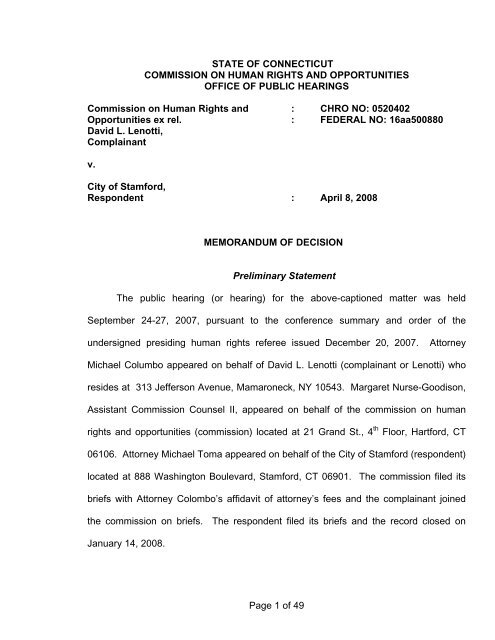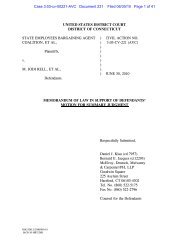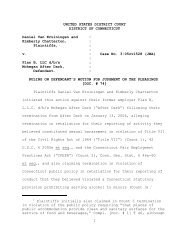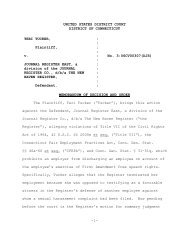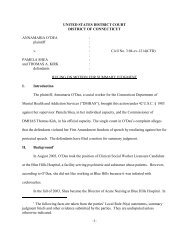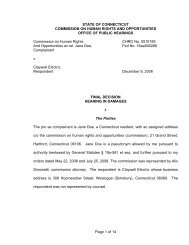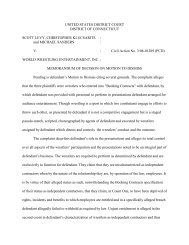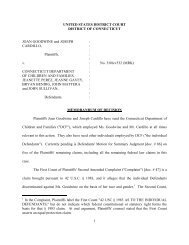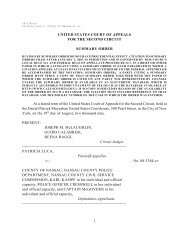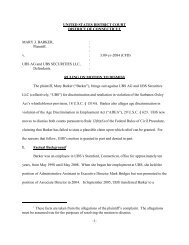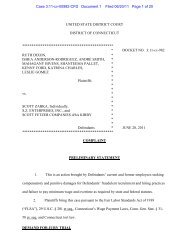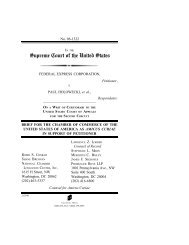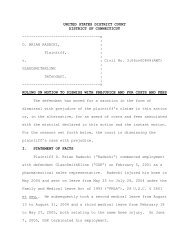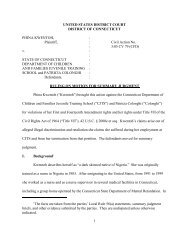CHRO ex. rel. Lenotti v. City of Stamford - Connecticut Employment ...
CHRO ex. rel. Lenotti v. City of Stamford - Connecticut Employment ...
CHRO ex. rel. Lenotti v. City of Stamford - Connecticut Employment ...
Create successful ePaper yourself
Turn your PDF publications into a flip-book with our unique Google optimized e-Paper software.
STATE OF CONNECTICUTCOMMISSION ON HUMAN RIGHTS AND OPPORTUNITIESOFFICE OF PUBLIC HEARINGSCommission on Human Rights and : <strong>CHRO</strong> NO: 0520402Opportunities <strong>ex</strong> <strong>rel</strong>. : FEDERAL NO: 16aa500880David L. <strong>Lenotti</strong>,Complainantv.<strong>City</strong> <strong>of</strong> <strong>Stamford</strong>,Respondent : April 8, 2008MEMORANDUM OF DECISIONP<strong>rel</strong>iminary StatementThe public hearing (or hearing) for the above-captioned matter was heldSeptember 24-27, 2007, pursuant to the conference summary and order <strong>of</strong> theundersigned presiding human rights referee issued December 20, 2007. AttorneyMichael Columbo appeared on behalf <strong>of</strong> David L. <strong>Lenotti</strong> (complainant or <strong>Lenotti</strong>) whoresides at 313 Jefferson Avenue, Mamaroneck, NY 10543. Margaret Nurse-Goodison,Assistant Commission Counsel II, appeared on behalf <strong>of</strong> the commission on humanrights and opportunities (commission) located at 21 Grand St., 4 th Floor, Hartford, CT06106. Attorney Michael Toma appeared on behalf <strong>of</strong> the <strong>City</strong> <strong>of</strong> <strong>Stamford</strong> (respondent)located at 888 Washington Boulevard, <strong>Stamford</strong>, CT 06901. The commission filed itsbriefs with Attorney Colombo’s affidavit <strong>of</strong> attorney’s fees and the complainant joinedthe commission on briefs. The respondent filed its briefs and the record closed onJanuary 14, 2008.Page 1 <strong>of</strong> 49
The issues addressed in this decision are: 1) whether the complainant proved bya preponderance <strong>of</strong> the evidence that the respondent discriminated against him on thebasis <strong>of</strong> his disabilities (learning disability and mental disorder) when it failed toreasonably accommodate him in the administration <strong>of</strong> a promotional <strong>ex</strong>amination(<strong>ex</strong>am) for the position <strong>of</strong> captain; and 2) if so, whether the complainant is entitled toany damages or other <strong>rel</strong>ief.For the reasons set forth below, it is hereby determined that the commission andthe complainant have proven that the respondent discriminated against the complainantin violation <strong>of</strong> state law. Judgment is entered in favor <strong>of</strong> the complainant and thecommission.Procedural HistoryOn March 1, 2005, the complainant filed his complaint affidavit (complaint) withthe commission alleging that the respondent discriminated against him on February 7,2005 when it failed to reasonably accommodate his disabilities (mental disorder andlearning disability) and when it failed to promote him, paid him a different rate <strong>of</strong> pay,and denied him a raise because <strong>of</strong> his disabilities in violation <strong>of</strong> General Statutes §§46a-58 (a), 46a-60 (a) (1), 46a-61, 46a-64; Title VII <strong>of</strong> the Civil Rights Act <strong>of</strong> 1964, asamended, 42 U.S.C 2000e and the Civil Rights Act <strong>of</strong> 1991; the Americans withDisabilities Act (ADA), 42 U.S.C. 12101 et seq. and § 504 <strong>of</strong> the Rehabilitation Act <strong>of</strong>1973, as amended.Page 2 <strong>of</strong> 49
The commission investigated the allegations <strong>of</strong> the complaint, found reasonablecause to believe that discrimination had occurred, and attempted to conciliate thematter. After conciliation failed, the complaint was certified to public hearing onNovember 20, 2006, in accordance with General Statutes § 46a-84 (a). On November27, 2006, the Office <strong>of</strong> Public Hearings issued to all parties <strong>of</strong> record the original notice<strong>of</strong> public hearing along with a copy <strong>of</strong> the complaint. The respondent filed an answer tothe complaint on December 13, 2006. The hearing was held on September 24 through27, 2007. All statutory and procedural prerequisites to the public hearing were satisfiedand this complaint is properly before the undersigned Presiding Referee for decision 1 .Findings <strong>of</strong> Fact1. The complainant began employment with the respondent as a firefighter in1990 after passing an <strong>ex</strong>am with a grade <strong>of</strong> 70. Tr. 18-19.2. In order to be appointed to lieutenant or captain, an individual must becomecertified for appointment. Tr. 847-49. This occurs by taking a promotional<strong>ex</strong>am and passing with at least a grade <strong>of</strong> 70, which would place thecandidate on an eligibility list. Tr. 22, 73, 157; R. Ex. 5, pp. 8, 14 and 18; andR. Ex. 35. Also, the candidate must receive a score that is among the threehighest scores or the fourth or fifth score within five points <strong>of</strong> the highestrating on an eligibility list in order to become certified for appointmentresulting in receiving an interview with the fire commission. R. Ex. 5, p. 21.Finally, the fire commission interviews the eligible candidates and selects thecandidates to be appointed to an open position/s. Tr. 42-50; R. Ex. 5, p. 21.1 References made to the transcript pages are designated as “Tr.” followed by the accompanying page numbers.References made to the <strong>ex</strong>hibits are designated as either “C. Ex.” for the complainant, “R.Ex.” for the respondent or“<strong>CHRO</strong> Ex.” for the commission followed by the accompanying <strong>ex</strong>hibit numbers. References made to the findings<strong>of</strong> fact are designated as “FF” followed by the accompanying numbers and references made to the briefs aredesignated as “R. Brief” and “R. Reply Brief” for the respondent and “C. Brief” and “C. Reply Brief” for thecommission and the complainant followed by the accompanying page numbers.Page 3 <strong>of</strong> 49
3. Fire Chief Robert McGrath <strong>of</strong> respondent’s fire department is a non-votingmember <strong>of</strong> the fire commission and he provides the fire commission withinformation concerning a candidates’ performance and character. Tr. 456-57.4. The eligibility list <strong>ex</strong>pires after two years have elapsed and the candidatesmust take the <strong>ex</strong>am again to become eligible, which is administeredapproximately every two years. Tr. 178, 481-82, 870, 1069-69. R. Ex. 5, p.19.5. All <strong>ex</strong>ams have 100 multiple-choice questions and are timed <strong>ex</strong>ams providingthe candidate with three and one half (3 ½ ) hours to answer questions. Tr.1035, 699-701; R. Ex. 37 and 38. The Vantage McCann (McCann) companygrades the <strong>ex</strong>ams, provides the respondent with a report that <strong>ex</strong>plains the<strong>ex</strong>am process and provides the candidates’ <strong>ex</strong>am scores. C. Ex. 16; Tr. 43.6. Some candidates complete the <strong>ex</strong>am before the time has <strong>ex</strong>pired. Tr. 699,722, 732, 794-95, 821 and 826.7. In 1998, the complainant took the <strong>ex</strong>am to be appointed to lieutenant andpassed with a score <strong>of</strong> 70. Tr. 22 and 980; R. Ex. 20.8. In 2000, the complainant was appointed to lieutenant upon <strong>ex</strong>haustion <strong>of</strong> theeligibility list, which means all individuals remaining on the list wereappointed. Tr. 25 –30, 989.9. The fire commission did not conduct a thorough interview when appointingthe complainant to lieutenant because it had three open positions and threecandidates remaining on the list; thus, all were appointed. Tr. 35, 989. Allthree candidates met with the fire commission during the same time. Tr. 1168.10. As a lieutenant, the complainant completed a one hundred forty (140) hourcourse to become certified as a hazardous material (hazmat) technician. Tr.375, 525 and 1083.11. In 2000, the respondent had concerns about the complainant’s report writingand referred him to Barbara Boller, a school psychologist for the respondent.Tr. 261; 1011-16.12. On November 13, 2000, Boller diagnosed the complainant with a languagebasedlearning disability and memorialized her findings in herreport/evaluation. Tr. 254-55; C. Ex. 4. Also, she recommended that thePage 4 <strong>of</strong> 49
complainant seek a medical consultation to discuss “ADHD” (attention deficithypertension disorder). Tr. 262-63; C. Ex. 4.13. In 2004, Simon Epstein, M.D., diagnosed the complainant with adult attentiondeficit disorder (ADD) and prescribed medication for him. Tr. 1037-39, 1042;C. Ex. 5; <strong>CHRO</strong> Ex. 15.14. Meryl Aronin, a speech language pathologist, diagnosed the complainant witha language based learning disability on June 21, 2007. Tr. 189; C. Ex. 6.15. The complainant is disabled with a learning disability, ADD and ADHD 2 . Tr.1029-30, 1037-39; C. Ex. 4 and 6; <strong>CHRO</strong> Ex. 15; complaint.16. The complainant’s learning disability is continuously present in his daily life.Tr. 1186-87.17. Aronin and Boller recommended that the complainant be given additional timewhen taking standardized <strong>ex</strong>ams as an accommodation or that the <strong>ex</strong>am notbe timed or be given verbally. C. Ex. 4 and 6; Tr. 200-03, 253, 254 and 258;Stipulation (Stip.), 4. Epstein also recommended that the complainant begiven additional time as an accommodation when taking <strong>ex</strong>aminations. C. Ex.5.18. In January 2001, the complainant provided Felicia Wirzbicki, a humanresources generalist <strong>of</strong> the respondent’s human resources department, withthe Boller report informing her <strong>of</strong> his learning disability and he requested anaccommodation to take the captain promotional <strong>ex</strong>am. Tr. 633, 641-43, 651and 653; C. Ex. 4.19. The respondent’s civil service rules provide for the personnel director todetermine a reasonable accommodation for a disabled person whencompeting in a selection process. Tr. 153-54, 651-52; R. Ex. 5.20. On February 8, 2002, the respondent granted testing accommodations <strong>of</strong>additional time (one and one half (1 ½) the standard time) to complete thefirefighter <strong>ex</strong>am for Scott R. Avalos, John Loglisci, Jr., Matthew Rees andMatthew R. Wolk who all had either a learning or mental disability. Tr. 294-95, 327, 350, 666-67; C. Ex. 10; C. Ex. 11, <strong>CHRO</strong> Ex. 24 and 25. Also, on2 The complainant refers to ADD as ADHD and the terms are used interchangeably.Page 5 <strong>of</strong> 49
July 11, 2005, the respondent granted a testing accommodation <strong>of</strong> <strong>ex</strong>tra time(1 ½ the usual amount) to complete the firefighter <strong>ex</strong>am for Neil Dennehy whohad a learning disability. <strong>CHRO</strong> Ex. 26.21. The complainant gave a letter dated October 25, 2002 with the Boller reportto Wirzbicki, formally requesting an accommodation for his disability to takethe captain <strong>ex</strong>am. Tr. 670, 1019-20; C. Ex. 2 and 4.22. In a letter dated November 18, 2002, human resources director WilliamStover denied the complainant’s request for an accommodation and hisreason for the denial was that the ability to quickly process information is anessential function <strong>of</strong> the current captain position and the <strong>ex</strong>am tests thatability. Tr. 658-60, 670; C. Ex. 9.23. On January 28, 2005, again, the complainant requested an accommodationto take the March 2005 captain promotional <strong>ex</strong>am. Tr. 63 and 1043; C. Ex. 3;Stip. 8.24. The complainant’s January 2005 accommodation request was for additionaltime (“time and one half”) to complete the <strong>ex</strong>am or for the <strong>ex</strong>am to be given inaudio form. Tr. 64; C. Ex. 3; Stip. 8.25. The complainant did not provide the respondent with Epstein’srecommendation letter and did not inform the respondent <strong>of</strong> his ADD. Tr.1043.26. In 2005, Wirzbicki contacted her current supervisor, Dennis Murphy, director<strong>of</strong> human resources, who contacted Chief McGrath regarding thecomplainant’s request. Wirzbicki provided Murphy with the complainant’srequest and the Boller evaluation. Tr. 63-65, 676-82; C. Ex. 7.27. Wirzbicki, with the advice <strong>of</strong> Murphy, denied the complainant’s request for anaccommodation on February 7, 2005. Tr. 119-20; C. Ex. 7-9; Stip. 9.28. No one from the respondent’s employ contacted the complainant to discusshis request for an accommodation. Tr. 1044-46. Murphy did not consult anypr<strong>of</strong>essionals <strong>ex</strong>cept for McGrath regarding this request in <strong>rel</strong>ationship to thecomplainant’s disability and his job duties. Tr. 64, 137-40, 170, 261-62, 681-90. Wirzbicki is not an <strong>ex</strong>pert in the area <strong>of</strong> learning disabilities as it <strong>rel</strong>ates toPage 6 <strong>of</strong> 49
firefighting and neither she nor McGrath consulted any pr<strong>of</strong>essionals in thearea <strong>of</strong> learning disabilities and the captain’s duties in regard to thecomplainant’s request. Tr. 261-62, 507, 684-87.29. In March 2005, the complainant took the captain promotional <strong>ex</strong>am without anaccommodation and passed with a score <strong>of</strong> 70, which ranked him at fourteen(14) on the eligibility list. There were thirteen (13) candidates who scoredhigher than the complainant. Tr. 1059-60; R. Ex. 33 and 35.30. The complainant studied for four months for the March 2005 captain <strong>ex</strong>am.Tr. 1076.31. On April 3, 2007, Murphy sent the complainant a letter requesting him tosubmit information for an accommodation to take the April 28, 2007 captain<strong>ex</strong>am. Tr. 99, 105-06, 1074; C. Ex. 15. This letter was not an invitation for thecomplainant to take the <strong>ex</strong>am with an accommodation but me<strong>rel</strong>y to submitinformation for consideration for an accommodation. Tr. 117, 1075-77; C. Ex.15.32. The complainant did not request an accommodation for the April 28, 2007<strong>ex</strong>am and did not take that <strong>ex</strong>am. Tr. 1075-77.33. The complainant has worked two thousand one hundred (2100) hours as anacting captain between January 8, 2004 and September 2007. Tr. 839 –41;<strong>CHRO</strong> Ex. 19.34. The complainant’s duties as an acting captain and as a lieutenant whichinvolve his abilities as a hazmat technician and a supervisor in dispatchincluded reading certain materials: pre-fire plans, which describe the layout <strong>of</strong>the building; computer screens; hazmat guidebook (R. Ex. 36), which is thereference book containing the chemical in question and directing how tomitigate the situation; placards, which identify the hazard; and material safetydata sheets (MSDS) (C. Ex. 23), which are the manufacturer’s specifications forthe chemical. The complainant has never had any performance problemswhile performing his duties. Tr. 156-57, 559, 567-72, 740-50, 1080 and 1094.Page 7 <strong>of</strong> 49
35. The written materials that could be referenced at an emergency scene orincident that a captain may have to read are: placards, MSDS, pre-fire plans,computer screens and the hazmat guidebook. Tr. 166, 406-10, 744-46.36. There have been no reported public safety problems concerning thecomplainant’s ability to read with respect to his job duties either as alieutenant or acting captain. Tr. 80-81, 570, 740, 754-55, 1080, 1087-89.37. The ability to read in a timely manner (speed reading) or to quickly processwritten information is not a required duty/function <strong>of</strong> the captain position. Tr.136, 746-47.38. The captain promotional <strong>ex</strong>am did not test the skill <strong>of</strong> reading in a timelymanner, at a specific rate <strong>of</strong> speed or <strong>of</strong> quickly processing information. The<strong>ex</strong>am tests the knowledge <strong>of</strong> the job, not the rate <strong>of</strong> reading. Tr. 70, 161.39. The <strong>ex</strong>am questions are in a multiple-choice format, not in a form similar to anactual practical circumstance <strong>of</strong> the captain job. Tr. 700-01, 782.40. The required knowledge, skills, abilities, minimum training and <strong>ex</strong>perienceand a special requirement <strong>of</strong> the captain position are (<strong>CHRO</strong> Ex. 13):a. Thorough knowledge <strong>of</strong> current principles and practices <strong>of</strong> firefighting andfire prevention;b. Good knowledge <strong>of</strong> first aid;c. Good knowledge <strong>of</strong> fire department administration;d. Good knowledge <strong>of</strong> supervisory practices;e. Ability to communicate effectively orally and in writing;f. One year <strong>of</strong> <strong>ex</strong>perience in the rank <strong>of</strong> fire lieutenant or eight years <strong>of</strong><strong>ex</strong>perience in the rank <strong>of</strong> firefighter in the <strong>Stamford</strong> fire department; andg. Within one year <strong>of</strong> appointment, must obtain and maintain State certification as aFire Safety Inspector.41. The duties and <strong>ex</strong>amples <strong>of</strong> the work <strong>of</strong> the captain position are (<strong>CHRO</strong> Ex.13.):a. Under the general supervision <strong>of</strong> a deputy fire chief, supervises theactivities <strong>of</strong> personnel in a fire and rescue company in firefighting, rescuePage 8 <strong>of</strong> 49
and other daily departmental duties; supervises the maintenance <strong>of</strong>departmental property and equipment; does <strong>rel</strong>ated work as directed;b. Responds to emergency incidents;c. Directs firefighters in the positioning <strong>of</strong> vehicles, laying hoses, operation <strong>of</strong>equipment, performing rescue work and other activities at emergencyincidents;d. Directs the work <strong>of</strong> firefighters in station duties, including the testing andmaintenance <strong>of</strong> equipment, training and re-training on procedures,equipment, general clean-up <strong>of</strong> area and general drills;e. Inspects area served by company to become familiar with the location <strong>of</strong>fire hydrants, physical layout <strong>of</strong> buildings, quickest travel route andpotential hazards;f. Performs fire safety inspections under general direction <strong>of</strong> the firemarshal;g. Inspects personnel, maintains discipline, transmits daily or special ordersto subordinates;h. Advises and instructs subordinates regarding department rules,regulations and procedures;i. May be assigned to staff duties such as training or fire prevention; andj. Meets with public in area served.42. The practical duties <strong>of</strong> a captain are (Tr. 403-15, 740):a. Supervising lieutenants and firefighters under his/her command;b. Making decisions in and out <strong>of</strong> the fire station, including analyzingfirefighting strategies, deciding whether additional response personnel andapparatus is needed;d. Performing as incident commander at emergency scenes on a daily basis;e. Directing the emergency operations consisting <strong>of</strong> evaluating the situationas to structural fire, vehicle accident, transportation-type accident, rescue,hazardous materials response;f. Determining whether additional units are required; andg. Reading written materials at the scene.Page 9 <strong>of</strong> 49
43. The complainant satisfactorily performed the duties <strong>of</strong> captain without anaccommodation while serving as an acting captain. Tr. 570, 773-79, 740-56.Also, the complainant was able to perform his role satisfactorily as an actingcaptain in the dispatch division without an accommodation for approximatelytwo years. Tr. 570, 774-79 and 1101-06.44. The complainant used ten (10) vacation days to participate in thislitigation at the commission’s <strong>of</strong>fices. Tr. 1151-52.IDISCUSSIONAFederal LawThe complainant alleged that the respondent violated Title VII, the ADA andSection 504 <strong>of</strong> the Rehabilitation Act <strong>of</strong> 1973, as enforced through General Statutes §46a-58 (a) when it discriminated against him because <strong>of</strong> his learning disability andmental disorder.However, § 46a-58 (a) does not bar discrimination on the bases <strong>of</strong>learning and mental disabilities.Section 46a-58 (a) provides: “It shall be adiscriminatory practice in violation <strong>of</strong> this section for any person to subject, or cause tobe subjected, any other person to the deprivation <strong>of</strong> any rights, privileges or immunities,secured or protected by the Constitution or laws <strong>of</strong> this state or <strong>of</strong> the United States, onaccount <strong>of</strong> <strong>rel</strong>igion, national origin, alienage, color, race, s<strong>ex</strong>, s<strong>ex</strong>ual orientation,blindness or physical disability.” Therefore, this tribunal does not have jurisdiction toadjudicate the complainant’s federal claims. Consequently, the complainant’s Title VII,ADA and Rehabilitation Act claims are dismissed. See Cosme v. Sunrise Estates, LLC,<strong>CHRO</strong> No. 0510210, June 29, 2007.Page 10 <strong>of</strong> 49
BState LawThe complainant also alleged that the respondent violated General Statutes §§46a-61 and 46a-64 et seq. However, the complainant and the commission neitherproduced evidence <strong>of</strong> these claims nor argued the merits <strong>of</strong> these causes <strong>of</strong> action intheir briefs 3 . Therefore, the complainant’s §§ 46a-61 and 64 claims are dismissed. Theremaining allegation is the claim for the violation <strong>of</strong> § 46a-60 (a) (1), which is viable andthe focus <strong>of</strong> this decision.The respondent has been charged with violating § 46a-60 (a) (1) for failing toaccommodate the complainant’s learning and mental disabilities, failing to promote him,denying him a raise and paying him a different rate <strong>of</strong> pay 4 . As set forth in § 46a-60(a), “It shall be a discriminatory practice in violation <strong>of</strong> this section: (1) For an employer,by the employer or the employer’s agent, <strong>ex</strong>cept in the case <strong>of</strong> a bona fide occupationalqualification or need . . . to discriminate against such individual in compensation or interms, conditions or privileges <strong>of</strong> employment because <strong>of</strong> the individual’s race, color,<strong>rel</strong>igious creed, age, s<strong>ex</strong>, marital status, national origin, ancestry, present or past history<strong>of</strong> mental disability, mental retardation, learning disability or physical disability . . ..”“While § 46a-60 (a) does not specifically require an employer to reasonablyaccommodate an employee’s disability, an employer’s duty to provide such reasonable3 In support <strong>of</strong> their argument for attorney’s fees, the commission and the complainant provided an <strong>ex</strong>tremely sparseargument, which contained three conclusory sentences asserting violations <strong>of</strong> § 46a-64 (a) (1) and (2) in thedamages section <strong>of</strong> their brief; the first time these violations were mentioned. C. Brief, pp. 46-47. Also, there wasno mention <strong>of</strong> their claim for a violation <strong>of</strong> § 46a-61 in their brief or reply brief.4 While the commission and complainant stated all but one (differential rate <strong>of</strong> pay) <strong>of</strong> these allegations in theirbrief, they only provided arguments pertaining to the failure to reasonably accommodate claim. C. Brief.Page 11 <strong>of</strong> 49
accommodation is, nevertheless, well established in <strong>Connecticut</strong> law. See, for <strong>ex</strong>ample,Conte v. Board <strong>of</strong> Education, judicial district <strong>of</strong> New Haven at New Haven, Docket No.CV-02-0466475 (2003 WL 21219371, 4) (May 15, 2003); Trimachi v. <strong>Connecticut</strong>Workers Compensation Committee, judicial district at New Haven, Docket No. CV-97-0403037s (June 14, 2000) (27 Conn. L. Rptr. 469, 473); Commission on Human Rights& Opportunities <strong>ex</strong> <strong>rel</strong>. Kochey v. Eastman Kodak Co., <strong>CHRO</strong> Case No. 8310319, 29-30(April 30, 1996); LaRoche v. United Technologies Corp., <strong>CHRO</strong> Case No. FEP-PD-60-1, 10-11 (August 28, 1978).” Cosme v. Sunrise Estates, LLC, <strong>CHRO</strong> No. 0510210, n. 4,June 29, 2007.It is well established that <strong>Connecticut</strong>’s anti-discrimination statutes areco<strong>ex</strong>tensive with the federal law on this issue and therefore, this case will be analyzedusing both the prevailing <strong>Connecticut</strong> and federal law. See Pik-Kwik Stores, Inc. v.Commission on Human Rights & Opportunities, 170 Conn. 327, 331 (1976). The statecourts look to federal fair employment case law when interpreting <strong>Connecticut</strong>’s antidiscriminationstatutes, but federal law should be used as a guide and not the end all forinterpreting state statutes. See Wroblewski v. L<strong>ex</strong>ington Gardens, Inc., 188 Conn. 44,53 (1982); see also State <strong>of</strong> <strong>Connecticut</strong> v. Commission on Human Rights &Opportunities, 211 Conn. 464, 470 (1989).Page 12 <strong>of</strong> 49
CFailure to Reasonably Accommodate1Prima Facie CaseThe appropriate legal standard 5 is the one articulated in Ezikovich v.Commission on Human Rights & Opportunities, 57 Conn. App. 767, 774 (2000). Acomplainant can prove a prima facie case <strong>of</strong> failure to reasonably accommodate hisdisability by showing that (1) his employer is subject to the statute under which the claimis brought, (2) he is an individual with a disability within the meaning <strong>of</strong> the statute, (3)he could perform the essential functions <strong>of</strong> the job with or without reasonableaccommodation, and (4) his employer had notice <strong>of</strong> the complainant’s disability andfailed to provide such accommodation. Id.; see also Curry v. Allan S. Goodman, Inc., _Conn. _, Docket No. SC 18025 (April 15, 2008); Stone v. Mount Vernon, 118 F.3d 92,96-97 (2d Cir. 1997); Borkowski v. Valley Central School District, 63 F.3d 131 (2d Cir.1995); Worthington v. <strong>City</strong> <strong>of</strong> New Haven, 1999 WL 958627 (D.Conn.). Thecomplainant bears the burden to show that a reasonable accommodation <strong>ex</strong>isted thatwould have allowed him to perform the essential functions <strong>of</strong> his job. Borkowski v.5 The parties applied the standard used in D’Amico v. New York State Board <strong>of</strong> Law Examiners, 813 F. Sup. 217(W.D.N.Y. 1993) to prove a prima facie case and turned to the burden shifting analysis <strong>of</strong> the disparate treatmentstandard <strong>of</strong> McDonnell Douglas Corp. v. Green, 411 U.S. 792, 802-04 (1973) to produce a legitimate businessreason and to T<strong>ex</strong>as Department <strong>of</strong> Community Affairs v. Burdine, 450 U.S. 248, 252-56 (1981) to prove pret<strong>ex</strong>t forPage 13 <strong>of</strong> 49
Valley Central School District, supra, 63 F.3d 138-39. Once the complainant hassatisfied his burden, the respondent has the burden to prove the accommodation wouldbe unreasonable or would cause undue hardship. Id.aDisabilityFirst, there is no dispute that the respondent is subject to the <strong>Connecticut</strong> fairemployment laws and, therefore, § 46a-60 (a) (1) is applicable as alleged. Second,under § 46a-51 (19), a person with a learning disability is defined as “an individual who<strong>ex</strong>hibits a severe discrepancy between educational performance and measuredintellectual ability and who <strong>ex</strong>hibits a disorder in one or more <strong>of</strong> the basic psychologicalprocesses involved in understanding or in using language, spoken or written, which maymanifest itself in a diminished ability to listen, speak, read, write, spell or to domathematical calculations.” The respondent argued that the complainant does not meetthe statutory definition <strong>of</strong> being learning disabled because he has not presentedevidence showing that he is an individual “who <strong>ex</strong>hibits a severe discrepancy betweeneducational performance and measured intellectual ability and who <strong>ex</strong>hibits a disorderin one or more <strong>of</strong> the basic psychological processes involved in understanding or inusing language.” R. Brief, p. 25.However, according to Boller’s psychological evaluation, the complainant has alanguage-based learning disability. FF 15. She reported that the complainant’s “[b]asicdecoding and spelling skills fell in the low average range and represent a clear andsignificant discrepancy between his high average to superior cognitive ability. Thisdiscrimination in order to analyze the complainant’s claim <strong>of</strong> failure to reasonably accommodate. C. Brief, pp. 26-32.Page 14 <strong>of</strong> 49
discrepancy and evidence <strong>of</strong> processing weaknesses would indicate that Mr. <strong>Lenotti</strong>meets the criteria to be considered learning disabled as outlined in the Individuals withDisabilities Education Act <strong>of</strong> 1997 (IDEA). His processing weaknesses are languagebased and have interfered with the acquisition <strong>of</strong> skills needed for reading,comprehension and writing.” C. Ex. 4. While Boller does not use the word “severe” toqualify discrepancy as stated in the <strong>Connecticut</strong> statute, she does report that thecomplainant’s discrepancy and processing weaknesses meet the criteria for beinglearning disabled under the federal law, IDEA 6 . Since General Statutes § 46a-51 (19)closely follows the IDEA in defining learning disability, I find that Boller’s evaluation <strong>of</strong>the complainant’s disability meets the definition for learning disability under § 46a-60 (a)(1). See Bartlett v. New York State Board <strong>of</strong> Law Examiners, et al., 970 F.Sup. 1094,1115, recon. denied, 2 F.Sup.2d 388 (1997), aff’d in part, vacated in part, 156 F.3d 321(1998), cert. granted, vacated, 527 U.S. 1031 (1999), on remand, 226 F.3d 69 (2000)(where New York’s definition <strong>of</strong> learning disability tracked the IDEA but quantified“severe” as a discrepancy <strong>of</strong> 50% or more … and the <strong>ex</strong>perts could not agree on auniform measure <strong>of</strong> discrepancy). Further support about this discrepancy was providedby Aronin who testified that the complainant has a significant discrepancy “specifically interms <strong>of</strong> the reading and the processing <strong>of</strong> language” involved with his testing abilityand intellectual ability. Tr. 246. Additionally, the respondent did not present <strong>ex</strong>perttestimony to rebut Boller’s findings <strong>of</strong> the complainant’s learning disability or otherwiseto define “severe discrepancy” <strong>ex</strong>cept to argue in its brief an unsupported lay6 A learning disabled person is defined as one who “does not achieve commensurate with his or her ageand ability level and has a severe discrepancy between achievement and intellectual ability in . . . [amongother things] basic reading skill. 34 C.F.R. § 300.543. ” (Internal quotation marks omitted.) Bartlett v. NewYork State Board <strong>of</strong> Law Examiners, et al., 970 F.Sup. 1094, 1115 (S.D.N.Y.1997).Page 15 <strong>of</strong> 49
interpretation <strong>of</strong> the term. R. Brief, p. 26. The complainant has proven that he isdisabled within the meaning <strong>of</strong> § 46a-51 (19).The commission also argued that the complainant had a mental disorderpursuant to § 46a-51 (20). A person with a mental disability is defined as “an individualwho has a record <strong>of</strong>, or is regarded as having one or more mental disorders, as definedin the most recent edition <strong>of</strong> the American Psychiatric Association’s ‘Diagnostic andStatistical Manual <strong>of</strong> Mental Disorders [DSM].’” § 46a-51 (20). It is undisputed thatEpstein diagnosed the complainant with ADD, which is defined in the DSM. FF 13.Also, the complainant testified that he has ADHD, which is also defined by the DSM. Tr.1037-39. Although there is no corroborating evidence regarding ADHD, the respondentdoes not dispute this. R. Brief, p.14. Therefore, I find the complainant is disabledpursuant to § 46a-51 (20) for having ADD and/or ADHD. FF 15. The complainant hasproven the first element <strong>of</strong> his prima facie case and, n<strong>ex</strong>t, I determine whether he canperform the essential functions <strong>of</strong> the position <strong>of</strong> captain (the job he desires (seeLovejoy-Wilson v. NOCO Motor Fuel, Inc., 263 F.3d 208, 216-18 (2 nd Cir. 2001)) with orwithout an accommodation.bPerform Essential Functions“[T]he identification <strong>of</strong> the essential functions <strong>of</strong> a job requires a fact-specificinquiry into both the employer's description <strong>of</strong> a job and how the job is actuallyperformed in practice.” Borkowski v. Valley Central, supra, 63 F.3d 140. Thecomplainant, a lieutenant and a certified hazardous material technician, has performedtwo thousand one hundred hours as an acting captain. FF 8, 10 and 33. ThePage 16 <strong>of</strong> 49
espondent’s classified service rules define “promotion <strong>ex</strong>amination” as “[a] test foradvancement within the service and limited to permanent [c]ity employees who meet theminimum qualifications specified in the job announcement.” R. Ex. 5, p.8. Thecomplainant completed the March 2005 captain promotional <strong>ex</strong>am and, thus, he met theminimum qualifications <strong>of</strong> the captain position. There was testimony from witnessesMcGrath and Fire Captain Daniel Hunsberger as to the fact that the complainant isqualified for the position <strong>of</strong> captain and can perform the essential duties. Hunsbergertestified that the complainant meets the essential functions <strong>of</strong> being a captain and thathe has no doubt that the complainant could function as a captain because “he’s done it.”Tr. 755, 773. The respondent’s witness, Chief Mcgrath testified, that <strong>Lenotti</strong>, as anacting captain in a leadership role, has fulfilled the captain’s duties that include readingin an acting capacity. Tr. 524-25. Assistant Fire Chief Peter Brown also testified that hebelieved the complainant should be appointed as captain if he passes the test and isappointed. Tr. 400. In fact, the respondent stated that whether the complainant canperform the job <strong>of</strong> captain is not the issue but rather whether the accommodation wasreasonable. R. Reply Brief, p.4.The respondent did not argue that the complainant could not perform theessential functions <strong>of</strong> captain with or without an accommodation. What the respondentdid argue was that the complainant “was not qualified to be appointed” to the position <strong>of</strong>captain because he did not score in the top three or five scores <strong>of</strong> the <strong>ex</strong>am 7 . R. Brief,7 The respondent provided this argument in its brief in support <strong>of</strong> its contention that the complainant cannot prove a prima facie case <strong>of</strong> discrimination <strong>of</strong> failure to promote. R. Brief, pp. 40-41. The respondentdid not argue in its briefs whether the complainant could perform the essential functions <strong>of</strong> the position <strong>of</strong>captain with or without an accommodation.8 The respondent’s contention that the captain position required reading in a timely manner moreappropriately supports its argument that accommodating the complainant’s disability is unreasonable and,thus, this will be analyzed later in this discussion.Page 17 <strong>of</strong> 49
pp. 40-41. The respondent further argued that complainant’s reading ability does notmeet the required reading skill <strong>of</strong> the position. In support <strong>of</strong> this, the respondent positedthat as an incident commander at a hazardous materials scene (a position held by acaptain), “reading must be done under a time constraint to determine how to defuse theemergency” and the complainant provided no evidence that he could performadequately in this scenario given his slow reading ability.” R. Reply Brief, p. 10. It alsoargued that the complainant did not present evidence that he had ever been an incidentcommander who read written data at a hazardous materials emergency. R. Reply Brief,p. 10.In its letter to the complainant denying the accommodation, the respondentstated that “[i]t is an essential function <strong>of</strong> the position <strong>of</strong> Fire Captain to quickly processwritten information in order to plan an effective fire attack.” C. Ex. 9. However, prior tosending the denial letter, there is no evidence in the job description or the practicalduties that supports the need to “quickly process written information“ as an essentialfunction <strong>of</strong> the job. FF 41-42. In fact, McGrath testified that the duty was simply “to readwritten material at the emergency scene.” Tr. 405-06.In support <strong>of</strong> the respondent’s reason for denying the complainant’s request,Brown testified that reading in a “timely manner” is an essential function <strong>of</strong> the job. Tr.395-96. Murphy testified that McGrath “indicated that the role <strong>of</strong> Captain at anemergency scene, a fire scene, etc., that the speed with which one needs to read andcomprehend is critical to effectively dealing with the emergency situation.” Tr. 66, 69,157. Murphy testified that a captain has to read fast. Tr. 177. He also testified inresponse to the question whether there is a difference in the speed <strong>of</strong> reading for aPage 18 <strong>of</strong> 49
lieutenant versus a captain, that he thinks the “focused function <strong>of</strong> this immediacy onthe fire scene for quick comprehension, and quick reading; that is the difference here.”Tr. 177-78. It was clear that Murphy was not certain <strong>of</strong> this issue. Murphy testified thathe did not know the amount <strong>of</strong> time needed to read a computer screen at a fire scene(referenced as “fire screens”) because “no timeframe was given, other than the quickerthe better.” Tr. 166, 171-72. Murphy testified that the ability to read in a “timely manner”is an ability that is necessarily implied by the job description for Fire Captain and thatMcGrath told him that reading speed and comprehension are important. Tr. 155-57.However, McGrath testified that “reading correctly or reading” is an essential functionand he made no mention <strong>of</strong> the rate <strong>of</strong> reading. Tr. 446-47. Indeed, McGrath stated thatan acting captain has to read materials at the scene <strong>of</strong> a fire. Tr. 524. Murphy statedthat “obviously Mr. <strong>Lenotti</strong> was promoted to Lieutenant, so obviously implicit in thesystem he can read fast enough to be a Lieutenant.” Tr. 177. In addition, Hunsbergertestified that there is no difference in the speed <strong>of</strong> reading for a lieutenant and that for acaptain. Tr. 746-47, 780. There is no dispute that the complainant has performed hisduties as a lieutenant, and since he has performed satisfactorily as a lieutenant, onecan infer his reading skills are sufficient for that <strong>of</strong> a captain absent any evidence to thecontrary.The job requirements <strong>of</strong> the captain position make no mention <strong>of</strong> the necessity toread in a timely manner or to quickly process written information. FF 40. When itreceived the complainant’s request, the respondent assumed because the complainantneeded <strong>ex</strong>tra time to take the <strong>ex</strong>am that he could not quickly process writteninformation. The complainant testified that he is very familiar with drafting and readingPage 19 <strong>of</strong> 49
pre-fire plans and has not had any problems reading those items. Tr. 1088-90. He alsotestified that he ra<strong>rel</strong>y has had to consult the Hazmat book and has only consulted itonce in seventeen (17) years as a firefighter, his testimony was not rebutted. Tr. 1081-82, 1094-97. In 1994, he stated that he referenced MSDS once while working withMcGrath. Tr. 1094-95. Also, he testified that he has never had problems readingplacards. Tr. 1100. The standard operating guidelines state that the procedure followedat a hazmat incident scene is to “[d]etermine the presence <strong>of</strong> hazardous materials.Many times this is accomplished prior to arrival through the dispatcher.” R. Ex. 4, SOG# 111.01. This is evidence that reading seldom occurs at a hazmat scene because thereading necessary to determine hazmat materials is done by the dispatcher. In fact, thecomplainant has read computer screens as a dispatch supervisor for approximately twoyears with no problems. FF 34 and 43.There is no evidence to corroborate the respondent’s contention that reading in atimely manner is an essential function <strong>of</strong> the captain position. In fact, there was muchuncertainty as to this criterion. Is the essential function “reading fast,” “quicklyprocessing written information,” “reading in a timely manner,” “reading in general” or“reading correctly?” The testimony was quite inconsistent. It appears that thecomplainant’s ability to quickly process written information was never an issue and didnot become an issue until he requested an accommodation to take the captainpromotional <strong>ex</strong>am. It is clear that the complainant must read materials as an actingcaptain, as a lieutenant, as a hazmat technician and while working as a supervisor indispatch, and he has never had any performance problems while doing his duties underemergency situations. FF 34.Page 20 <strong>of</strong> 49
I do not find that reading in a timely manner or quickly processing writteninformation is an essential function <strong>of</strong> the captain position 8 . No precise definition hasbeen provided for these terms. I do find that reading during emergency situations is aduty <strong>of</strong> the captain position. FF 35. However, even if I did find reading in a timelymanner or quickly processing written information to be an essential function <strong>of</strong> thecaptain position, the complainant as an acting captain has performed the essentialfunctions <strong>of</strong> the captain job to the satisfaction <strong>of</strong> the respondent, which is sufficient tomeet this element <strong>of</strong> his prima facie case. See Cole v. Millard Fillmore Hospital, 116 F.3d 465 (2d Cir. 1997) (satisfactory performance is performing the job at a level whichmeets legitimate <strong>ex</strong>pectations <strong>of</strong> the employer). Given the testimony that thecomplainant is qualified for the captain position, it is not necessary to analyze each jobrequirement, duty, and the practical skills <strong>of</strong> the captain position to the qualifications <strong>of</strong>the complainant. I find that he is able to perform the essential functions <strong>of</strong> the captainposition with or without a reasonable accommodation. FF 43.cEmployer’s Knowledge <strong>of</strong> DisabilityN<strong>ex</strong>t I must determine whether the respondent had knowledge <strong>of</strong> thecomplainant’s disability. First, the respondent was fully aware <strong>of</strong> the complainant’slearning disability. Initially, in January 2001, the complainant provided the Bollerpsychological evaluation to Wirzbicki, which informed her <strong>of</strong> his language-basedlearning disability and recommended “untimed and/or oral tests when the requiredreading is compl<strong>ex</strong>” (his need for an accommodation). FF 17. The respondent has hadPage 21 <strong>of</strong> 49
knowledge <strong>of</strong> the complainant’s learning disability since January 2001 or alternatively,at least since October 25, 2002 when the complainant formally submitted his initialrequest. FF 18 and 21.Second, the respondent argued that it was not aware <strong>of</strong> the complainant’sADD/ADHD. R. Brief, p. 25. The commission argued that the respondent “was wellaware <strong>of</strong> [Boller’s] recommendation that the [c]omplainant seek a medical consultationabout ADHD.” C. Reply Brief, p. 3. The complainant did not consult Epstein until 2004regarding ADD and Epstein diagnosed the complainant with ADD. FF 13; <strong>CHRO</strong> Ex. 15and 16. However, the complainant did not provide the respondent with Epstein’s letteror inform the respondent <strong>of</strong> his ADD. FF 25. While the Boller evaluation recommended“a medical consultation to discuss ADHD,” Boller did not diagnose the complainant atthe time with ADHD. FF 12. I find that the respondent had no knowledge <strong>of</strong> thecomplainant’s ADD/ADHD. However, the complainant has proven that the respondenthad knowledge <strong>of</strong> his language based learning disability and n<strong>ex</strong>t must show that herequested a reasonable accommodation, which accommodation the respondent denied.dRequest and Denial <strong>of</strong> AccommodationOn January 28, 2005, the complainant requested that the respondent administerthe captain promotional <strong>ex</strong>am in an audio format or provide him with <strong>ex</strong>tra time to takethe <strong>ex</strong>am as a reasonable accommodation for his disability. FF 23 and 24. Therespondent granted other requests from firefighters with learning disabilities for thesame accommodation, <strong>ex</strong>tra time to take an <strong>ex</strong>am (see C. Ex. 10 –11; <strong>CHRO</strong> Ex. 24-25), and the Boller report recommended “untimed tests” for the complainant. FF 17 andPage 22 <strong>of</strong> 49
20. “The ADA defines ‘reasonable accommodation’ as . . . appropriate adjustment ormodifications <strong>of</strong> <strong>ex</strong>aminations . . . and other similar accommodations for individuals withdisabilities. 42 U.S.C. § 12111 (9).” Beck v. University <strong>of</strong> Wisconsin Board <strong>of</strong> Regents,75 F.3d 1130, 1135 (7 th Cir. 1996). The complainant requested an accommodation thathe believed was reasonable.On February 7, 2005, the respondent denied the complainant’s request for anaccommodation to take the March 2005 captain promotional <strong>ex</strong>am. FF 27. In its denialletter, the respondent <strong>ex</strong>plained that it had reviewed the complainant’s request with theentire record <strong>of</strong> his first request in October 2002, which also had been denied. FF 27; C.Ex. 2. The respondent stated that “there [was] no reason to alter the decision that wasreached on this matter in the past.” C. Ex. 8; Stip. 9.In the previous denial letter <strong>of</strong>November 18, 2002, the respondent referenced the complainant’s October 25, 2002request for an accommodation, denied the accommodation and provided a reason forthe denial. FF 22; C. Ex. 2. The complainant has proven a prima facie case bysatisfying this last element in that he requested a reasonable accommodation and therespondent denied his request.2Interactive Dialogue“Once a disabled individual has suggested to his employer a reasonableaccommodation, federal law requires, and we agree, that the employer and theemployee engage in an informal, interactive process with the qualified individual with adisability in need <strong>of</strong> the accommodation . . . [to] identify the precise limitations resultingfrom the disability and potential reasonable accommodations that could overcome thosePage 23 <strong>of</strong> 49
limitations. 29 C.R.R. § 1630.2 (o) (3). In this effort, the employee must come forwardwith some suggestion <strong>of</strong> accommodation, and the employer must make a good faitheffort to participate in that discussion.” (Internal quotation marks omitted.) Curry v. AllanS. Goodman, Inc., _ Conn. _, Docket No. SC 18025 (April 15, 2008). See also Beck v.University <strong>of</strong> Wisconsin Board <strong>of</strong> Regents, supra, 75 F.3d 1135 (“[t]he appropriatereasonable accommodation is best determined through a fl<strong>ex</strong>ible, interactive processthat involves both the employer and the [employee] with a disability”).Here, thecomplainant provided Wirzbicki with a request for an accommodation in January 2005.FF 23. Wirzbicki provided Murphy with the Boller evaluation and the complainant’sletter requesting an accommodation. FF 26. Murphy made the decision to deny therequest. FF 27. He did not consult with <strong>Lenotti</strong> or any medical pr<strong>of</strong>essionals regarding<strong>Lenotti</strong>’s request. FF 28. He testified that he <strong>rel</strong>ied on McGrath’s judgment that thecomplainant cannot respond to emergency incidents because lack <strong>of</strong> skill andcomprehension or speed and comprehension. Tr. 132. However, Chief McGrathtestified that he was not aware that the request was for <strong>Lenotti</strong>. Tr. 530-31. McGrathtestified that he did not make the decision to deny the accommodation and, in fact, hedoes not believe anyone with a reading disability should be provided <strong>ex</strong>tra time to takean <strong>ex</strong>am. Tr. 530-35. Murphy did not consult anyone else other than McGrath todiscuss <strong>Lenotti</strong>’s request and McGrath did not consult any <strong>ex</strong>perts on reading regarding<strong>Lenotti</strong>. FF 28. In addition, neither Wirzbicki nor the human resources departmentconsulted any <strong>ex</strong>perts on reading or learning disabilities as it pertained to <strong>Lenotti</strong>, andWirzbicki did not consult McGrath. FF 28.Page 24 <strong>of</strong> 49
There is much evidence in the record that the respondent made no effort tocontact the complainant to engage in a meaningful discussion to determine his preciselimitations from his learning disability and discuss potential reasonable accommodationsthat could overcome those limitations. By its lack <strong>of</strong> any communication with thecomplainant and with any medical pr<strong>of</strong>essionals, the respondent did not make a goodfaith effort to determine an appropriate accommodation if any. The respondent could befound liable for failure to accommodate me<strong>rel</strong>y based on its failure to initiate aninteractive process with the complainant; Beck v. University <strong>of</strong> Wisconsin Board <strong>of</strong>Regents, supra, 75 F.3d 1137; however, the respondent argued that it was notreasonable to accommodate the complainant.3Respondent’s Defenses <strong>of</strong> Unreasonable AccommodationOnce the complainant proves a prima facie case, the respondent has the burdento show that it denied the accommodation because it was unreasonable or would causeundue hardship. See Borkowski v. Valley Central School District, supra, 63 F.3d 131.Section 46a-60 (a) (1) allows for an <strong>ex</strong>ception to discrimination if the employer has abona fide occupational qualification/need (BFOQ). The respondent’s position is that itdid not provide an accommodation because “reading speed” is an essential function <strong>of</strong>the job, which constituted a business justification for denying the request for a testingaccommodation. Reply Brief, p. 6. It argued that it was unreasonable to allow thecomplainant to use additional time to take the <strong>ex</strong>am because reading in a timely manneris a business necessity <strong>of</strong> the captain position; and that providing additional time wouldPage 25 <strong>of</strong> 49
e unreasonable due to public safety concerns on the job. R. Brief, pp. 21-23 and 28-30. This is a two-part argument for showing the accommodation was not reasonable.aJob RelatednessFirst, the respondent argued that the requested accommodation “would haveeliminated from the <strong>ex</strong>am process the need to read under a predetermined timeconstraint. Reading under this time constraint is necessary to test the ability to read in atimely manner, which is an essential function <strong>of</strong> the job <strong>of</strong> Fire Captain.” R. Brief, p. 15,R. Reply Brief, p. 9. In its November 18, 2002 denial letter, the respondent stated that“[i]t is an essential function <strong>of</strong> the position <strong>of</strong> Fire Captain to quickly process writteninformation in order to plan an effective fire attack. . . . the <strong>ex</strong>amination must beadministered in written form and within the predetermined time limit, in order to test,among other things, a candidate’s ability to quickly process written information.” FF 22.“Nothing in [Title VII <strong>of</strong> the Civil Rights Act] precludes the use <strong>of</strong> testing or measuringprocedures; obviously they are useful. What Congress has forbidden is giving thesedevices and mechanisms controlling force unless they are demonstrably a reasonablemeasure <strong>of</strong> job performance. Congress has not commanded that the less qualified bepreferred over the better qualified simply because <strong>of</strong> minority origins. Far fromdisparaging job qualifications as such, Congress has made such qualifications thecontrolling factor, so that race, <strong>rel</strong>igion, nationality, and s<strong>ex</strong> become ir<strong>rel</strong>evant. WhatCongress has commanded is that any tests used must measure the person for the joband not the person in the abstract.” Griggs v. Duke Power Co., 401 U.S. 424, 436Page 26 <strong>of</strong> 49
(1971). The respondent’s argument bears on whether the <strong>ex</strong>am was job-<strong>rel</strong>ated andconsistent with business necessity. R. Brief p. 21.The question is whether the captain promotional <strong>ex</strong>amination is “a test intendedto measure the applicants’ ability to read [quickly/timely] or ability to perform underspecific time constraints and, necessarily, whether those abilities are ‘essentialfunctions’ <strong>of</strong> being a [captain].” Bartlett v. New York Law Examiners, supra, 970 F. Sup.1130. As determined above, reading in a timely manner or quickly processing writteninformation was not an essential function <strong>of</strong> the captain position. However, even if thisfunction was an essential function <strong>of</strong> the captain position, the evidence showed that the<strong>ex</strong>am did not test for that skill but measured the knowledge <strong>of</strong> the job. FF 38.There was no evidence that the captain <strong>ex</strong>am was intended to test the speed <strong>of</strong>reading. When asked whether it was discussed to give the complainant a different type<strong>of</strong> <strong>ex</strong>am than the standardized one everyone else takes, Murphy responded, “we didn’twant to test for reading and comprehension but reading and comprehension was anessential functioning <strong>of</strong> the Captain on a fire scene.” Tr. 69. He further testified that the<strong>ex</strong>am does not test for comprehension but tests your knowledge <strong>of</strong> fire fighting. Tr. 70.He also testified that “[t]here are tests designed for -- to scale one’s reading andcomprehension abilities. This test is not designed for that, however implicit in beingsuccessful in this test one needs to read and comprehend words.” Tr. 69-70.In direct contradiction to the respondent’s argument that the <strong>ex</strong>am is necessaryto test the ability to perform or read under time constraints, the respondent has provided<strong>ex</strong>tra time on <strong>ex</strong>ams as an accommodation to firefighters with learning disabilities. FF20. The respondent’s reason for this was that the captain’s duties and the entry-levelPage 27 <strong>of</strong> 49
firefighters’ duties are very different at emergency scenes. R. Reply Brief, p. 4. Itargued that reading is critical for a captain, who supervises and directs the rank and file,but entry-level firefighters are not incident commanders and therefore they do not readat emergencies, but take direction from supervisors. R. Reply Brief, p. 5. Contrary tothis, there is evidence in the record that firefighters also may have to read materials atan emergency scene. Firefighters Avalos, Wolk, Loglisci and Rees, who all had sometype <strong>of</strong> a learning disability, were all provided <strong>ex</strong>tra time as an accommodation to takethe <strong>ex</strong>am. FF 20. Avalos testified that a firefighter also reads materials; however, it israre. Tr. 306-08. McGrath corroborated this testimony when he testified that when<strong>Lenotti</strong> worked as a firefighter he might have been given materials to read at the scene<strong>of</strong> a fire. Tr. 556. McGrath further testified, “a lot <strong>of</strong> that responsibility <strong>of</strong> reading some<strong>of</strong> these manuals, reading pre-fire plans, could be delegated to a firefighter in theDeputy Chief’s aide classification so to speak, which is not a classified job by the way.It usually goes to seniority.” Tr. 556-57. Ironically, the respondent allows for afirefighter to receive an accommodation for a learning disability, even though afirefighter with a learning disability may on rare occasions have to read at the scene <strong>of</strong>an emergency.The captain <strong>ex</strong>am is three and one half hours in length. FF 5. Taking a timed<strong>ex</strong>am does not necessarily determine that the test takers can read quickly unless thataspect is being <strong>ex</strong>amined. It may show that anyone who took the test and passed witha high score can read and knew the material, but not necessarily that they can readquickly because there is no statistical evidence regarding the rate <strong>of</strong> speed for average,slow or fast readers <strong>rel</strong>ated to this particular <strong>ex</strong>am. In fact, the McCann report states,Page 28 <strong>of</strong> 49
“[t]he time limit is designed so that all candidates will have sufficient time to answer allquestions on the <strong>ex</strong>amination without being rushed.” FF 5; C. Ex. 16, p. 2. TheMcCann report is in complete opposition to respondent’s argument that the presentcase is similar to DiPompo v. West Point Military Academy, 770 F. Sup. 887, 889-90(S.D.N.Y. 1991) where the court held a firefighter must read at emergency scenes andoperate “under time pressure” in hazmat situations. The respondent argued, “[i]t is thistime pressure that the DiPompo court referred to that was the basis for the respondent’sdenial <strong>of</strong> the testing accommodation[ ] in [the present] case. Granting the requestedaccommodations would have eliminated the ‘time pressure’ aspect <strong>of</strong> the written<strong>ex</strong>amination to the <strong>ex</strong>tent that the <strong>ex</strong>amination no longer would be testing an applicant’sability to read in a predetermined time frame.” R. Brief, p. 21. However, in DiPompo v.West Point Military Academy, supra, 770 F. Sup. 888-91, the plaintiff asked to eliminatemuch <strong>of</strong> the reading necessary to perform the job and the court held it was notreasonable because it would materially change the job and unacceptably compromisepublic safety. Here, the complainant is not asking to change the job and there is noindication that the <strong>ex</strong>am measures the skill <strong>of</strong> working under time pressures.Also, there was no evidence that the questions on the test are in the same formas would appear for a captain on the job at an emergency scene to test for the rate <strong>of</strong>reading. See Crane v. Dole, et al., 617 F. Sup. 156, 160 (D.D.C. 1985) (court held thetest was not job-<strong>rel</strong>ated and was “in a form completely unlike the circumstances underwhich the job would actually be performed”). The <strong>ex</strong>am questions are in a multiplechoiceformat, not in a form similar to an actual practical circumstance <strong>of</strong> the captainjob. FF 39. If reading quickly or in a timely manner was truly a required qualification <strong>of</strong>Page 29 <strong>of</strong> 49
the position <strong>of</strong> captain then one would think that the respondent would provide an <strong>ex</strong>amspecifically for testing the skill <strong>of</strong> the speed at which one reads. If the rate for readingwas truly a required qualification for the captain position, the criterion, e.g., “must read100 words per minute” should be stated in respondent’s records or documents for theposition, which according to the evidence, it was not.There was no evidence in the record that once an <strong>ex</strong>am is graded the category <strong>of</strong>the speed at which one read or at which one completed the <strong>ex</strong>am was recorded andcompared to other candidates or met a preset criterion for speed. The <strong>ex</strong>am allows acandidate to spend three and one half hours answering the questions and somecandidates complete the <strong>ex</strong>am before the time has <strong>ex</strong>pired. FF 5-6. However, noanalysis <strong>of</strong> their score and <strong>of</strong> the time they completed the <strong>ex</strong>am was done for those whoscored in the top rankings. In addition, there was no evidence <strong>of</strong> the particular rate <strong>of</strong>speed one is required to read to perform the duties <strong>of</strong> a captain. I find the <strong>ex</strong>am is not atest intended to measure the applicant’s ability to read quickly or in a timely manner.bSafety DefenseThe second part <strong>of</strong> respondent’s argument was that if a captain did not quicklyprocess written information or read in a timely manner he could jeopardize or causeharm to public safety. R. Brief. p.28. Tr. 368-69. The respondent argued that “there isno reasonable accommodation that would allow a slow reader to safely perform thereading responsibilities <strong>of</strong> a [c]aptain acting as an incident commander at the scene <strong>of</strong> a[hazmat] emergency. R. Brief, p. 23. A safety defense may be used to constitute anPage 30 <strong>of</strong> 49
employer’s BFOQ. See Commission on Human Rights & Opportunities v. GeneralDynamics Corp., et al. 1995 WL 264014, 8-9 (Conn.Super.); see also Johnson v. State<strong>of</strong> <strong>Connecticut</strong> Department <strong>of</strong> Correction, <strong>CHRO</strong> No. 9740163, (March 9, 2000). Therespondent has the burden to prove the safety defense and meets its burden byshowing “there would have been a reasonable probability <strong>of</strong> substantial harm to theapplicant or others with respect to the specific jobs in issue . . ..” (Citations omitted.)Commission on Human Rights & Opportunities v. General Dynamics Corp., supra, 1995WL 264014, 9.The federal courts give additional guidance on the safety defense.In Lovejoy-Wilson v. NOCO Motor Fuel, Inc., supra 263 F.3d 219-20, thedefendant asserted the affirmative defense that the plaintiff was not a qualifiedindividual because she posed “a direct threat to the health or safety <strong>of</strong> other individualsin the workplace. . . . The ADA defines ‘direct threat’ as ‘a significant risk to the health orsafety <strong>of</strong> others that cannot be eliminated by reasonable accommodation.’ . . .Expanding on the ‘direct threat’ language, the EEOC has stated that it ‘means asignificant risk <strong>of</strong> substantial harm to the health or safety <strong>of</strong> the individual or others thatcannot be eliminated or reduced by reasonable accommodation.’ . . . The EEOCguidelines further provide that: An employer . . . is not permitted to deny anemployment opportunity to an individual with a disability me<strong>rel</strong>y because <strong>of</strong> a slightlyincreased risk. The risk can only be considered when it poses a significant risk, i.e. highprobability, <strong>of</strong> substantial harm; a speculative or remote risk is insufficient. . . . Toprotect disabled individuals from discrimination based on prejudice, stereotypes, orunfounded fear, . . . an individualized assessment <strong>of</strong> the [employee’s] present ability tosafely perform the essential functions <strong>of</strong> the job based on medical or other objectivePage 31 <strong>of</strong> 49
evidence is required[.]” (Citations omitted; internal quotation marks omitted.) Id., 220.see also Simms v. The <strong>City</strong> <strong>of</strong> New York, et al., 160 F.Sup.2d 398, 406-07 (E.D.N.Y.2001); Jansen v. Food Circus Supermarkets, Inc., 110 N.J. 363, 375-77 (1988) (indetermining a reasonable probability <strong>of</strong> substantial harm, the determination cannot bebased me<strong>rel</strong>y on an employer’s subjective evaluation or me<strong>rel</strong>y on medical reports, butthe employer must consider employee’s work history and medical history); Mantolete v.Bolger, 767 F.2d 1416, 1422 (9 th Cir. 1985) (“an employer must gather all <strong>rel</strong>evantinformation regarding the applicant’s work history and medical history, andindependently assess both the probability and severity <strong>of</strong> potential injury. This involves,<strong>of</strong> course, a case-by-case analysis <strong>of</strong> the applicant and the particular job”).In order to determine whether an individual would cause harm to the publicsafety, four criteria should be considered: “(1) the duration <strong>of</strong> the risk [how long it lasts];2) the nature and severity <strong>of</strong> the potential harm; (3) the likelihood that potential harm willoccur; and 4) the imminence <strong>of</strong> potential harm . . ..” (Citations omitted.) Lovejoy-Wilsonv. NOCO Motor Fuel, Inc., supra, 263 F.3d 220. The complainant’s learning disability inwhich he needs <strong>ex</strong>tra time to take <strong>ex</strong>ams is continuously present. FF 16. Thecomplainant has never incurred an injury or caused any harm to himself or others as aresult <strong>of</strong> his disability or reading ability. FF 36. Similar to Lovejoy, until thecomplainant’s request for an accommodation and this litigation, the respondent had not<strong>ex</strong>pressed a concern about the complainant’s ability to perform his job as a lieutenant oracting captain because <strong>of</strong> such a risk <strong>of</strong> potential harm.McGrath testified that the threat to the public and the fire department personnelincreases with the passage <strong>of</strong> time. Tr. 417. However, there was no actual evidence toPage 32 <strong>of</strong> 49
characterize the “nature or type <strong>of</strong> threat.” McGrath further testified, “But I would say,yes, that is a problem if you’re a slow reader and can’t make timely decisions withregard to life, safety and saving property.” Tr. 447. McGrath testified that a “timelyfashion” means: “Within a few minutes after responding, getting on the scene, size upand you know you just can’t sit around and say let me read this four or five times andsee if I can comprehend it. Meanwhile, the fire or the incident is escalating to the pointwhere it can cause more damage and possibly loss <strong>of</strong> lives at the scene.” Tr. 552.Although McGrath provided an <strong>ex</strong>ample here <strong>of</strong> the nature and severity <strong>of</strong> potentialharm, there was no evidence that the complainant needed to read materials at anemergency scene four or five times. In direct contradiction to his testimony, McGrathtestified that the complainant always has completed his assignments in a timely fashion.Tr. 484-85.The respondent argued that based on McGrath’s testimony, “[I]t stands to reasonthat as an incident commander reads materials at the scene <strong>of</strong> an emergency, theemergency will worsen as time passes until mitigation efforts begin.” R. Brief, p.19.Without any <strong>ex</strong>pert or any analytical support for its contention, McGrath’s testimonyme<strong>rel</strong>y stated his own general thoughts that an increased delay over the normal period“more likely” would cause, for <strong>ex</strong>ample, an <strong>ex</strong>plosion. R. Brief, p.19; Tr. 417. Here,again, McGrath provides an <strong>ex</strong>ample <strong>of</strong> a type <strong>of</strong> potential harm, an <strong>ex</strong>plosion, but noevidence that the complainant’s disability would cause an increased delay. There wasno <strong>ex</strong>planation or definition as to what constituted the “normal period” or “increaseddelay.” In other words, there was no testimony as to the nature and severity <strong>of</strong> thePage 33 <strong>of</strong> 49
potential harm that would be caused by the rate at which the complainant reads at anemergency scene.In addition, the likelihood that potential harm would occur was not established bythe respondent. Murphy testified that McGrath “indicated to [him] in [McGrath’s]judgment, <strong>ex</strong>perience and knowledge, he knew that there was a sufficiently substantialthreat . . ..” Tr. 142. However, in response to the question whether McGrath haddocumentation as to the potential likelihood <strong>of</strong> “Mr. <strong>Lenotti</strong> posing any particular harm tothe safety <strong>of</strong> others,” Murphy testified, “No, no there’s no document giving a probabilityor you know, a 20 probability or 80 percent, no.” Tr. 141-42. Assistant Chief Brown alsotestified that “there’s a lot <strong>of</strong> the people that you work with and -- and public safety is a --is <strong>of</strong> utmost importance to be able to -- to be able to read, comprehend and to takeappropriate actions in a very timely fashion.” Tr. 368. When asked whether he believesa slow reader can effectively be a captain, Brown testified, “I believe that there’s apossibility that could have an adverse effect on the public safety.” Tr. 368. However, hedid not <strong>ex</strong>plain the amount <strong>of</strong> possibility or provide evidence as to the nature <strong>of</strong> theadverse effect to public safety.McGrath testified that in his opinion a delay in reading material safety datasheets (MSDS) could cause additional damage to a building. Tr. 436. McGrath alsotestified that cor<strong>rel</strong>ations have been established in the firefighting field between the timethat passes and the increase in severity <strong>of</strong> risk <strong>of</strong> harm to people or property. Tr. 440.He testified that in his opinion a reading difficulty could result in a delay in resolving theemergency and can be detrimental. Tr. 445. He testified that “[f]or every minute that isdelayed, an incident can escalate probably up to 25 to 50 percent more.” Tr. 440.Page 34 <strong>of</strong> 49
However, no one from the respondent’s employ evaluated the amount <strong>of</strong> time thecomplainant used to read during an actual emergency scene or under a simulatedemergency situation compared to the respondent’s so-called “timely manner”requirement, to accurately determine the likelihood the complainant’s learning disabilitywould cause a substantial risk <strong>of</strong> harm. In fact, McGrath testified that before he foundout that the complainant had a learning disability, there were no problems with himbeing a first responder at an emergency scene, but now that he knows <strong>of</strong> complainant’sdisability, he believes there is a possibility that there could be a problem. Tr. 492. Yet,he also testified that he had no empirical data to support this “possibility <strong>of</strong> a problem.”Tr. 493.McGrath provided <strong>ex</strong>amples <strong>of</strong> incidents showing that firefighting is dangerouswork and any delay could be harmful to the public. Tr. 417-43. These incidents did nothave anything to do with an individual or captain reading slowly which had causedadditional harm.McGrath testified that a delay in general could cause problems, notnecessarily particularly because <strong>of</strong> reading slowly or not reading correctly. Tr. 495-501.This evidence does not prove the likelihood or imminence <strong>of</strong> potential harm thatthe complainant’s disability would cause to the public safety. Just the opposite,McGrath testified that he has never seen the complainant compromise anybody’s safetyby not being able to read certain compl<strong>ex</strong> words (e.g., chemicals) used at a fire scene.Tr. 502. Hunsberger testified that during a six-month time frame while he was thecomplainant’s supervisor in dispatch, he was not made aware <strong>of</strong> any issues regardingpublic safety concerning the speed at which the complainant read materials. Tr. 779.Hunsberger also negated the respondent’s concern for safety because he testified thatPage 35 <strong>of</strong> 49
lieutenants and acting captains read the same materials Tr. 740, 746-47. He stated thatat the emergency scene, someone may have to read placards, MSDS, or othermaterials, which can be read by the first person arriving at the scene who can be afirefighter in the position <strong>of</strong> acting lieutenant, a lieutenant, or captain. Tr. 743-47. Therate at which the complainant read has never been a safety problem. FF 36.The respondent’s belief that complainant’s disability would cause harm to publicsafety is mere speculation. In Dipol v. New York Transit Authority, 999 F.Sup. 309, 316(E.D.N.Y 1998), the court held “[a] slightly increased risk is not enough to constitute adirect threat; there must be a high probability <strong>of</strong> substantial harm. . . . Moreover, a merespeculative or remote risk is not sufficient . . ..” (Citations omitted.) Similarly, in Jansenv. Food, supra, 110 N.J. 377-78, the court held “to invoke the safety defense as ajustification for otherwise unlawful discrimination, the employer must reasonablyconclude that the employee’s [disability] poses a materially enhanced risk <strong>of</strong> seriousinjury. . . . [I]n the absence <strong>of</strong> <strong>ex</strong>pert testimony linking the likelihood <strong>of</strong> a seizure to thelikelihood <strong>of</strong> harm, the lower courts should not have assumed that Jansen was unableto work as a meat cutter without materially enhancing the risk <strong>of</strong> harm to himself orothers. Jansen’s work involved the use <strong>of</strong> sharp instruments, . . . [the employer] mustprove, not assume, that [the plaintiff] was dangerous.” Here, the evidence shows thatthe respondent did not consult medical <strong>ex</strong>perts, the complainant or any pr<strong>of</strong>essionalsother than Chief McGrath (FF 28), which it should have done in order to determinewhether the complainant’s disability would pose a significant risk <strong>of</strong> substantial harm toothers or that he could not safely work as a captain.Page 36 <strong>of</strong> 49
The respondent argued that Boller’s report (C. Ex. 4) constituted anindividualized assessment and, therefore, the “[r]espondent had no reason to questionthe report’s findings. The complainant, through the Boller report, substantiated that hewas a slow reader. No further assessment <strong>of</strong> his reading ability was needed.” R. ReplyBrief, p. 11. The respondent clearly did not link the complainant’s ongoing learningdisability with the likelihood <strong>of</strong> harm. The respondent argued that Lovejoy and the manycases that the complainant cited involved an employee seeking an accommodation toperform his job and which do not apply to a testing accommodation case where the“focus” is on whether the accommodation would render the test ineffective at testing theskills <strong>of</strong> the job. R. Reply Brief, p.12. While the respondent’s argument has some merit,the respondent ignores its own contention in this “testing accommodation case.” Thepsychologist, Boller, determined that the complainant was in need <strong>of</strong> an accommodationfor his disability for taking standardized <strong>ex</strong>ams. FF 17. Aronin even said thecomplainant only needs an accommodation for test taking, not for reading to perform hisjob. FF 17; Tr. 210-11, 258. Epstein also recommended that the complainant be givenadditional time to take <strong>ex</strong>ams. FF 17. There was no evidence that he needed anaccommodation to perform his job as acting captain or the captain position. Therespondent not only made the focus <strong>of</strong> this testing accommodation case whether the<strong>ex</strong>am tests the ability to quickly process written information under time constraints, butthe respondent also contended that its denial <strong>of</strong> the accommodation was justifiedbecause the captain position requires an employee to read in a timely manner in orderto safely perform the duties. R. Reply Brief, pp. 6-8.Page 37 <strong>of</strong> 49
Similar to respondent’s criticism <strong>of</strong> the commission’s cited cases involvingaccommodations for jobs, the respondent raised the safety defense as its BFOQ andcited cases that do not apply to testing accommodations but involve safety concernswhile performing jobs. R. Brief, p. 28-30; See e.g., Johnson v. State <strong>of</strong> <strong>Connecticut</strong>Department <strong>of</strong> Correction, <strong>CHRO</strong> No. 9740163 (March 9, 2000) and DiPompo v. WestPoint Military Academy, et al., 770 F.Sup. 887 (S.D.N.Y. 1991).The respondentargued that the present case is similar to that <strong>of</strong> Johnson v. State <strong>of</strong> <strong>Connecticut</strong>Department <strong>of</strong> Correction, supra, <strong>CHRO</strong> No. 9740163, where the employer asserted thesafety defense and the issue was whether the complainant could “run” and here, theissue is whether the complainant can “read in a timely manner” in order to avoid harm topublic safety. R. Brief 28. However, unlike Johnson, in which the complainant’s jobrequired her to run to help others in an emergency, which she could not do, the captainposition did not require <strong>Lenotti</strong> to read in a timely manner under emergency scenarios;however, he is able to read, which is a function <strong>of</strong> the job. FF 35 and 42.The complainant’s ability to read is not at issue; it is how quickly he can read,which was pr<strong>of</strong>fered by the respondent for the reason for denying his accommodation.As mentioned above, the respondent does circles around the word “read” by arguingmany different qualifiers for the word, e.g., read fast, read correctly, read quickly, read ina timely fashion, and read in general. The respondent’s business necessity or BFOQargument is highly inconsistent and incredible. Obviously the complainant can readsince the respondent has placed and kept him in a position where he must read for hisjob. Reading quickly or in a timely manner is not an essential function <strong>of</strong> the captainposition. The complainant did not request an accommodation to do the job as captain,Page 38 <strong>of</strong> 49
ut requested an accommodation to take an <strong>ex</strong>am for the captain position. Therespondent has failed to assess the complainant’s disability with the job requirementsand instead has made assumptions regarding the complainant’s limitations as they<strong>rel</strong>ate to the captain position and potential harm to the public safety.The respondent has not proven its safety defense. The respondent failed toconduct a reasonable assessment <strong>of</strong> the complainant’s request for an accommodationbefore denying his request. Most, if not all <strong>of</strong> the respondent’s evidence wasspeculative at best with regard to the likelihood and imminence <strong>of</strong> potential harm toothers. Of course, the respondent presented evidence that a fire or an emergencyscene is already an imminent situation, and testified that any delays could cause thesituation to get worse. Tr. 440. However, the respondent failed to establish thelikelihood that potential harm would occur based on a delay in reading or that thecomplainant’s learning disability poses a materially enhanced risk <strong>of</strong> serious injury to analready dangerous situation. Evidence was not presented <strong>of</strong> an actual assessment orevaluation conducted <strong>of</strong> complainant’s learning disability, medical or work history andjob duties to determine, for <strong>ex</strong>ample, that if he takes five minutes longer to read at anemergency scene than a captain without a known learning disability; he would causesubstantial specific harm or damage, than would have occurred if the <strong>ex</strong>tra five minuteswere not taken. There have been no reported public safety problems concerning thecomplainant with respect to his job duties either as a lieutenant or acting captain. FF 36.In Lovejoy-Wilson v. NOCO Motor Fuel, Inc., supra, 263 F.3d 218, the court heldthat the plaintiff “was entitled to a reasonable accommodation, if one is available, topermit her to compete with nondisabled applicants on an equal basis/footing to becomePage 39 <strong>of</strong> 49
an assistant manager.”Similarly, in the present case, the respondent should haveallowed the complainant to compete with non-disabled applicants on an equal basis byproviding him with a reasonable accommodation to take the captain <strong>ex</strong>am. In addition,unlike the plaintiff in Lovejoy, where the plaintiff requested a reasonableaccommodation to perform an essential function <strong>of</strong> the position that she desired, herethe complainant is not asking for an accommodation to eliminate reading or to beallowed to read slower in order to perform the essential functions <strong>of</strong> the captain position,but is me<strong>rel</strong>y asking for an accommodation to take the captain <strong>ex</strong>am.IICONCLUSIONThe complainant has proven that the respondent discriminated against him whenit failed to accommodate his disability. The respondent failed to prove that theaccommodation was unreasonable by failing to prove the <strong>ex</strong>am was job-<strong>rel</strong>ated andby failing to prove its safety defense. The respondent failed to accommodate thecomplainant by failing to engage in an interactive process to determine whether areasonable accommodation <strong>ex</strong>ists. The complainant’s claims <strong>of</strong> failure to promote,denial <strong>of</strong> a raise and differential rate <strong>of</strong> pay are dismissed.IIIDAMAGESPursuant to General Statutes § 46a-86 (a), the presiding referee has theauthority to order the respondent “to cease and desist from the discriminatory practicePage 40 <strong>of</strong> 49
and further requiring the respondent to take such affirmative action as in the judgment<strong>of</strong> the presiding <strong>of</strong>ficer will effectuate the purpose <strong>of</strong> [chapter 814c, discriminatorypractices]." Pursuant to General Statutes § 46a-86 (b), the presiding referee has theauthority “ to order the hiring or reinstatement <strong>of</strong> employees . . ..” The <strong>Connecticut</strong>Supreme Court has further stated that "the victim <strong>of</strong> a discriminatory practice is to beaccorded his rightful place in the employment scheme, that is he has a right to berestored to the position he would have attained absent the unlawful discrimination . . .such an order for <strong>rel</strong>ief may include retroactive and prospective monetary <strong>rel</strong>ief . . .where prohibited discrimination is involved the hearing <strong>of</strong>ficer has not me<strong>rel</strong>y the powerbut the duty to render a decree which will, so far as possible, eliminate thediscriminatory effects <strong>of</strong> the past as well as bar like discrimination in the future."(Citations omitted; internal quotation marks omitted.) State v. Commission on HumanRights & Opportunities, 211 Conn. 464, 478 (1989); Silhouette Optical Limited v.Commission on Human Rights & Opportunities, No. CV92520590 (Superior Court,Judicial District <strong>of</strong> Hartford/New Britain at Hartford, Jan. 27, 1994, Maloney, J.).“This remedial goal is furthered by vesting in a [human rights referee] broaddiscretion to award reinstatement, back pay or other appropriate remedies specificallytailored to the particular discriminatory practices at issue. . . . [Section 46a-86 (b)]vests discretion in a [human rights referee] to grant such <strong>rel</strong>ief under the propercircumstances.” Commission on Human Rights & Opportunities v. Truelove andMaclean, Inc. et al., 238 Conn. 337, 350-51 (1996).Consistent with federal law, thegoal <strong>of</strong> the courts is to make the complainant whole and put him in the position he wouldPage 41 <strong>of</strong> 49
have been in absent the discriminatory conduct. See Landgraf v. USI Film Prods., 511U.S. 244, 254 (1994).The complainant has requested that he be placed in the position <strong>of</strong> captain.Doing so would eliminate him from having to take the captain promotional <strong>ex</strong>am, whichis required by all candidates pursuant to the civil service rules. FF 2. As this casecenters on a claim for failure to reasonably accommodate a disability for an <strong>ex</strong>am, I donot believe bypassing the <strong>ex</strong>am for which the complainant requested anaccommodation would be prudent or proper. In the alternative, the complainantrequested that he be given the accommodation he requested in order to take thecaptain promotional <strong>ex</strong>am to be appointed to captain. Tr. 1160-61. I have found thatthe respondent failed to accommodate the complainant and therefore is liable fordamages resulting from such failure. Had the respondent provided the complainant withthe accommodation he requested in 2005, the complainant would have known whetherhe would have scored high enough (obtained the required score (FF 2)) to be certifiedfor appointment. Although the n<strong>ex</strong>t step in the civil service rules after receiving therequired score on the <strong>ex</strong>am is for the fire commission to interview the candidate andselect a candidate for appointment to captain, I do find that this particular step can bebypassed.The fire commission interviews the candidates and makes the selections forappointment to captain. FF 2. Chief McGrath testified that he has provided the firecommission with information regarding a candidate’s character, attendance,performance and leadership skills, and if asked about <strong>Lenotti</strong>, he would tell the firecommission that the complainant always did his assignments in a timely fashion and hePage 42 <strong>of</strong> 49
is an <strong>ex</strong>cellent candidate. FF. 3; Tr. 484-85. McGrath also believes that thecomplainant would probably be promoted if he received an interview. Tr. 486. Also, theinterview process is not always necessary in the event that the respondent has thesame number <strong>of</strong> candidates as open positions. FF 9. Thus, all <strong>of</strong> the eligible candidatesmay be placed in the open positions without the need for a thorough interview by the firecommission. FF 9.Unlike Bartlett v. New York State Board <strong>of</strong> Law Examiners, 226 F.3d 69 (2 nd Cir.2000) and D’Amico v. New York State Board <strong>of</strong> Law Examiners, 813 F. Sup. 217(W.D.N.Y. 1993), where the defendants were entities with only the authority to grant atesting accommodation and bar admittance to practice law, not with the authority toprovide a position for employment, in the present case, the respondent is the employingentity with the authority to grant a testing accommodation, to certify the eligiblecandidate for appointment and ultimately to appoint the candidate to the desiredposition.If the complainant had been granted an accommodation to take the <strong>ex</strong>am, it isspeculative whether he would have obtained the required score and been appointed bythe fire commission to the captain position. However, the complainant firmly believesthat he would obtain the required score if provided with the accommodation <strong>of</strong> additionaltime. Tr. 1163.Since the respondent denied the accommodation in 2005, thecomplainant has been placed at least three years behind his goal to become captain.Therefore, in light <strong>of</strong> the discrimination by the respondent, the fact that the respondent isthe same entity to grant an accommodation and to make appointments to the captainposition, the <strong>rel</strong>axed nature <strong>of</strong> the interview process, the evidence establishing that thePage 43 <strong>of</strong> 49
complainant can perform the essential functions <strong>of</strong> captain with or without anaccommodation and the testimony <strong>of</strong> McGrath that he would provide a positiverecommendation <strong>of</strong> the complainant to the fire commission, the interview process hereshall be bypassed. Accordingly, the respondent shall provide the complainant withadditional time to complete the captain <strong>ex</strong>am and if the complainant obtains the requiredscore on the captain <strong>ex</strong>am, which would certify him to be eligible for appointment, heshall be appointed to the captain position. See Commission on Human Rights &Opportunities, <strong>ex</strong> <strong>rel</strong> Pamela Hodge v. State <strong>of</strong> <strong>Connecticut</strong>, Department <strong>of</strong> PublicHealth, <strong>CHRO</strong> No. 9710032, October 6, 1999 (complainant was awarded promotionwithout having to interview for position).The eligibility lists <strong>ex</strong>pire every two years and the eligibility list created from theApril 28, 2007 <strong>ex</strong>am would be due to <strong>ex</strong>pire in two years, approximately April 28, 2009or soon thereafter, unless the list was <strong>ex</strong>hausted sooner. FF 4 and 8. The complainantshall have the option to take the n<strong>ex</strong>t regularly scheduled captain <strong>ex</strong>am or a captain<strong>ex</strong>am administered between September 1 and December 31, 2008 (the ordered <strong>ex</strong>am).If he chooses to take the ordered <strong>ex</strong>am and he passes it, he shall be placed on thecurrent <strong>ex</strong>isting eligibility list and if he obtains the required score pursuant to the civilservice rules to be certified for appointment, he shall be placed on any subsequenteligibility lists. If he chooses to take the n<strong>ex</strong>t regularly scheduled <strong>ex</strong>am and he obtainsthe required score, placing him on the respective eligibility list and certifying him forappointment, he shall be placed on any subsequent eligibility lists. As a result, thecomplainant shall not be required to take any further captain promotional <strong>ex</strong>ams and heshall be appointed to the current or n<strong>ex</strong>t available captain position without having toPage 44 <strong>of</strong> 49
interview with the fire commission. After taking either the ordered <strong>ex</strong>am or the n<strong>ex</strong>tregularly scheduled <strong>ex</strong>am and in the event there is not a captain position available, heshall be paid the difference in the captain salary and his current salary until a captainposition becomes available. If the complainant chooses not to take either the n<strong>ex</strong>tregularly scheduled captain <strong>ex</strong>am or the ordered captain <strong>ex</strong>am, but instead takes asubsequent captain <strong>ex</strong>am and obtains the required score; he shall not receive theadvantages <strong>of</strong>: 1) being placed on subsequent eligibility lists without having to takesubsequent captain <strong>ex</strong>ams; 2) being awarded the n<strong>ex</strong>t available captain position withouthaving to interview with the fire commission; and 3) being paid the difference <strong>of</strong> thelieutenant and captain’s salaries until a captain position becomes available.Additionally, the complainant testified that he lost sixteen days <strong>of</strong> vacation forhaving to participate in this litigation at the commission’s <strong>of</strong>fices. Tr. 1151-52. Thecomplainant did not provide evidence as to the specific vacation days lost. Therespondent argued that the complainant provided no pro<strong>of</strong> <strong>of</strong> the number <strong>of</strong> vacationdays lost and the presiding referee has no authority to award lost vacation days. R.Reply Brief, 18-19. However, the respondent did not provide evidence at the hearing torebut the complainant’s testimony regarding the sixteen days lost; instead, it attemptedto provide new evidence in its brief. R. Reply Brief, 19. The respondent contended thatseven days were used to meet with the commission’s staff both during the investigativeand public hearing processes. R. Reply Brief, 19. The respondent’s evidence will not beaccepted. I find from the record <strong>of</strong> the public hearing file, the complainant participatedat the public hearing <strong>of</strong>fice attending settlement conferences, a pretrial conference andthe public hearing on a total <strong>of</strong> approximately seven days. In addition, the commission’sPage 45 <strong>of</strong> 49
egulations provide for the commission investigator to conduct intake, fact finding,mediation and conciliation meetings and the complainant testified that he attendedmeetings with an investigator at the Bridgeport regional <strong>of</strong>fice. Tr. 1070; Regs., Conn.State Agencies § 46a-54-1a. I find the complainant to be credible, but without specificevidence (testimony or documentation) regarding the type <strong>of</strong> meetings he attended oneach <strong>of</strong> the sixteen vacation days lost, I find reimbursement for ten days <strong>of</strong> vacationtime to be reasonable and fair. FF 44.There is evidence in the record to show the complainant is able to perform theessential functions <strong>of</strong> the captain position with or without a reasonable accommodation.Here, I find, in order to make the complainant whole, it is necessary to bypass theinterview process and appoint the complainant to the n<strong>ex</strong>t available position <strong>of</strong> captainin the event that he completes either <strong>of</strong> the above stated captain <strong>ex</strong>ams with anaccommodation and obtains the required score.IVORDER1. The respondent shall issue the captain promotional <strong>ex</strong>am to the complainanteither between September 1 and December 31, 2008 and provide thecomplainant with at least four months prior written notice <strong>of</strong> the <strong>ex</strong>am issuancedate;or the complainant may take the captain <strong>ex</strong>am on the n<strong>ex</strong>t regularly scheduleddate that the captain <strong>ex</strong>am is due to be administered. The complainant shallPage 46 <strong>of</strong> 49
inform the respondent in writing within two weeks <strong>of</strong> this decision as to whichoption above he has chosen in order to take the captain <strong>ex</strong>am.2. The respondent shall provide the complainant with the additional time, one andone half (1 ½) the standard time, to complete the captain promotional <strong>ex</strong>am.3. If the complainant chooses to take the captain <strong>ex</strong>am between September 1 andDecember 31, 2008 and he obtains the required score (within the top three orfive scores as required by the civil service rules) based on the current <strong>ex</strong>istingeligibility list, the respondent shall appoint the complainant to the n<strong>ex</strong>t availableposition <strong>of</strong> captain.4. If the complainant chooses to take the <strong>ex</strong>am on the n<strong>ex</strong>t regularly scheduled datethat the captain <strong>ex</strong>am is due to be administered and provided the complainant’sscore on the <strong>ex</strong>am is within the top three or five scores on the respectiveeligibility list as required by the civil service rules, the respondent shall appointthe complainant to the current or n<strong>ex</strong>t available captain position.5. If the complainant’s score on the captain <strong>ex</strong>am from one <strong>of</strong> the two options statedabove is within the top three or five scores on the respective eligibility list asrequired by the civil service rules certifying him for appointment and there are noavailable captain positions, the respondent shall place the complainant on anysubsequent eligibility lists until he is appointed to a captain position and, as aresult, the complainant shall not be required to take any subsequent captain<strong>ex</strong>ams.6. If the complainant’s score on one <strong>of</strong> the above stated <strong>ex</strong>ams is within the topthree or five scores on the respective eligibility list as required by the civil servicePage 47 <strong>of</strong> 49
ules certifying him for appointment and there are no available captain positions,the respondent shall pay the complainant the difference in the appropriatecaptain’s salary and his then current salary from the time certifying him forappointment until the n<strong>ex</strong>t captain position becomes available.7. The respondent shall on an ongoing basis provide the complainant withreasonable accommodations for his disability in regard to <strong>ex</strong>am taking.8. The respondent shall provide the complainant with ten days <strong>of</strong> vacation.9. The Respondent shall cease and desist from engaging in any furtherdiscriminatory conduct towards the complainant or any employees, as well asfrom any retaliatory conduct against the complainant or any person whoparticipated in this proceeding.10. The respondent shall participate in training in the areas <strong>of</strong> federal and statedisability laws on accommodations for disabled employees. The respondentshall submit to the commission the name and contact information <strong>of</strong> the trainerand a copy <strong>of</strong> the curriculum/agenda within a reasonable period <strong>of</strong> time prior tocommencement <strong>of</strong> the training. The commission shall be given an opportunity toreview and comment upon said agenda/curriculum or any other training tools,and any commission recommendations shall be incorporated into the training.11. The respondent shall develop and maintain a written policy for all municipalemployees to utilize when requesting testing accommodations under state lawand the ADA. The written policy shall include but not be limited to: the nameand/or title <strong>of</strong> the person receiving requests and reviewing the requests, and thenecessary documents to be submitted for the review.Page 48 <strong>of</strong> 49
_________________________Donna Maria Wilkerson BrillantPresiding Human Rights RefereeDavid L. <strong>Lenotti</strong><strong>City</strong> <strong>of</strong> <strong>Stamford</strong> c/o Felicia Wirzbicki, Human Resources GeneralistAttorney Michael Colombo, Jr.Attorney Michael TomaMargaret Nurse-Goodison, Assistant Commission Counsel IIPage 49 <strong>of</strong> 49


